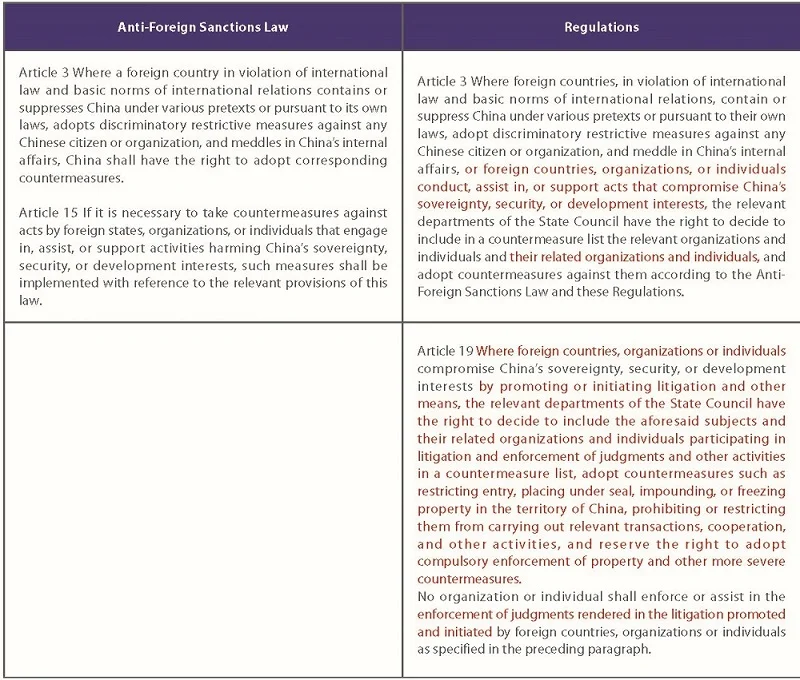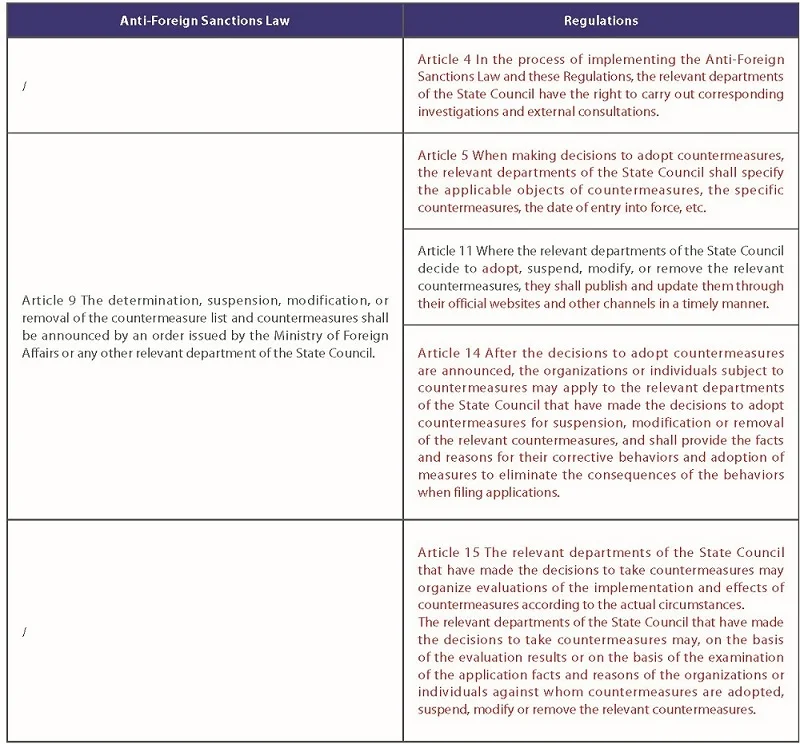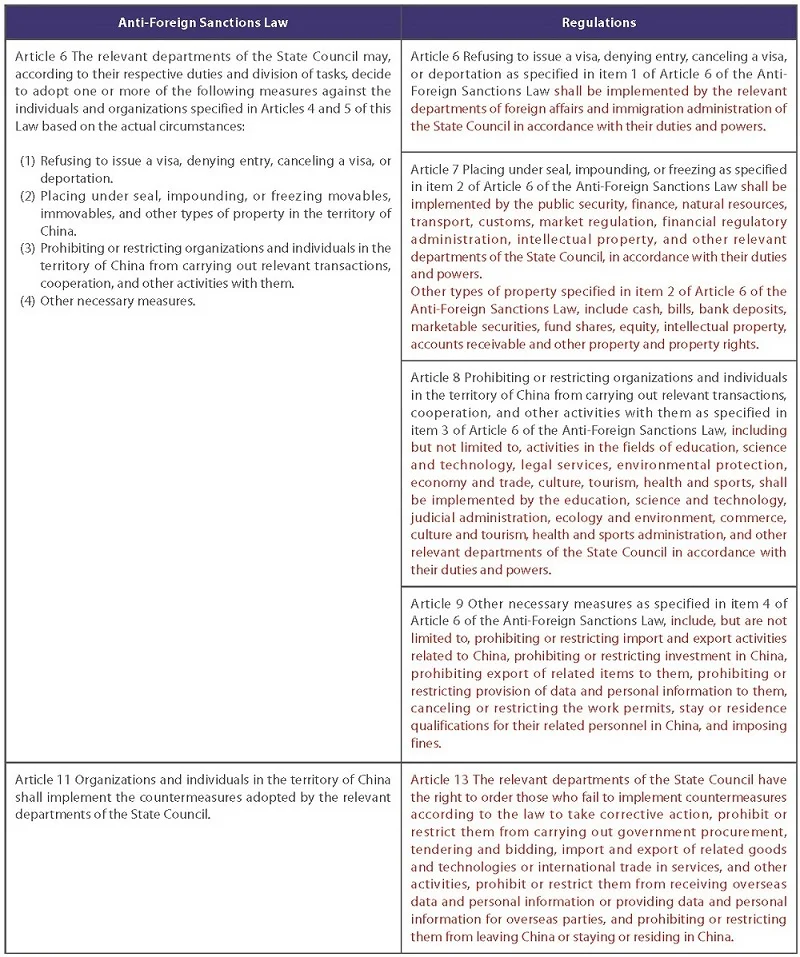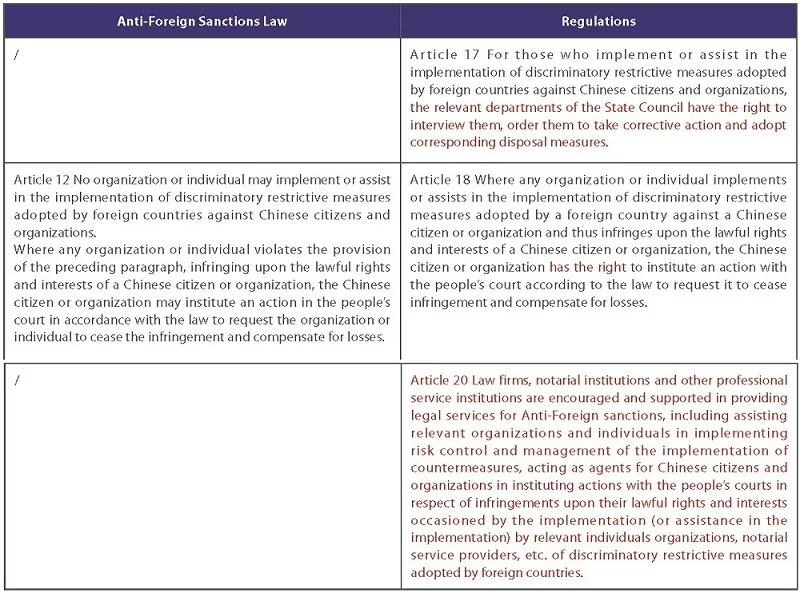Introduction
On March 24, 2025, Premier Li Qiang signed State Council Order No. 803 “Regulations for the Implementation of the Anti-Foreign Sanctions Law of the People’s Republic of China” (the “Regulations”), which took effect upon its announcement.
Since the Anti-Foreign Sanctions Law was enacted on June 10, 2021, China’s anti-sanctions enforcement has focused on foreign state interference in China’s internal affairs, especially on issues related to Taiwan, Xinjiang, and Tibet. For details, please refer to our previous analysis.
In recent years, the global geopolitical and legal environment has become more complex. Foreign-invested enterprises operating in China have faced mounting regulatory challenges in areas such as overseas export controls, sanctions, tariffs, and cross-border investment review. At the same time, China’s anti-sanctions enforcement has become more active and targeted. On the legislative front, Article 33 of the Law on Foreign Relations of the People’s Republic of China, effective from July 1, 2023, states that, “in response to acts that endanger its sovereignty, national security and development interests in violation of international law or fundamental norms governing international relations, the People’s Republic of China has the right to adopt corresponding counter-measures or restrictive measures” and that “the State Council and its departments adopt administrative regulations and departmental rules as necessary, establish related working institutions and mechanisms, and strengthen inter-departmental coordination and cooperation to adopt and enforce measures mentioned in the preceding paragraph.”
It is against this backdrop that the Regulations were introduced. The Regulations provide detailed guidance on the relevant provisions of the Anti-Foreign Sanctions Law by clarifying its scope of application, the specific nature of the available counter-measures, the responsibilities of enforcing departments, the consequences of violations, the means of redress, and other details. The Regulations are designed to enhance the effectiveness of countermeasures and serve as a framework for deepening the implementation of various countermeasures. At the same time, the Regulations raise the bar for foreign-invested enterprises operating in China in understanding and balancing compliance requirements across multiple legal regimes.
Please click here to read the PDF version.
The countermeasures are likely to focus on actions that harm China’s sovereignty, security, and development interests.
Articles 3 and 15 of the Anti-Foreign Sanctions Law establish the scope of the law’s application. Based on these provisions, the primary focus is on actions by foreign countries that “interfere in China’s internal affairs” (such as on issues related to Taiwan, Xinjiang, Tibet, and Hong Kong). Although Article 15 seems to expand the scope to include actions that “harm China’s sovereignty, security, and development interests,” the structuring and phrasing of the article seem to suggest that the Anti-Foreign Sanctions Law’s primary focus is not on such categories of actions.
The Regulations introduce significant changes in terms of the scope of application of the Anti-Foreign Sanctions Law. Article 3 explicitly places both “interference in China’s internal affairs” and “harm to China’s sovereignty, security, and development interests” on an equal footing. These legislative adjustments signal China’s firm determination to adopt a more proactive and assertive approach in implementing countermeasures against discriminatory or restrictive actions that either interfere with China’s internal policy or harm China’s sovereignty, security, and development interests. These adjustments are deeply connected with the broader international economic and geopolitical tensions between China and the United States. In recent years, the United States government has consistently used methods such as export controls, investment reviews, tariffs and procurement restrictions to limit China’s development. Although these actions are not typical forms of “interference in China’s internal affairs,” they have significantly squeezed the space for Chinese enterprises and harmed China’s development interests.
Additionally, Article 19 further specifies that litigation promoted or initiated by foreign parties that harms China’s sovereignty, security, and development interests also falls into the realm of the Regulations. For example, since the COVID-19 pandemic, several U.S. state governments have filed lawsuits against Chinese government entities, claiming that China hoarded personal protective equipment during the pandemic and demanding substantial compensation. In the future, the Regulations will serve as a legal tool to counter these abusive lawsuits. Entities involved in such politically motivated litigation may also become targets for countermeasures.
Enhancing procedural rules for countermeasures, moving towards regularized enforcement
The Anti-Foreign Sanctions Law provides only general provisions regarding enforcement procedures for countermeasures. In practice, the Ministry of Foreign Affairs’ general approach has been to simply add entities directly to the countermeasure list. The Regulations further refine these procedural rules in terms of pre-enforcement procedures, transparency in enforcement and adjustments to countermeasures. These refinements will make enforcement more structured while also signaling more proactive, systematic, and regularized enforcement by the Chinese government.
In terms of the pre-enforcement procedures, the Regulations explicitly grant authorities the power to conduct investigations and external consultations before implementing countermeasures. As China expands the scope of its countermeasures in response to a more complex international landscape, conducting investigations and external consultations will, on the one hand, help authorities gather more comprehensive information, make informed decisions, and determine necessary countermeasures. On the other hand, for enterprises, the likelihood of receiving countermeasure investigations from the relevant authorities will increase in the future and countermeasure enforcement will become a more normal feature of the regulatory landscape. However, it is important to note that these investigations and consultations are discretionary rather than mandatory. Authorities retain the right to impose countermeasures directly without prior investigation or consultation.
In terms of transparency in enforcement, the Anti-Foreign Sanctions Law only requires that the determination, suspension, modification, or removal of countermeasures or countermeasure lists shall be announced by an order but does not specify details such as the required content of any announcement, the channels for publishing the announcement or requirements for updating countermeasures. The Regulations introduce clearer guidelines on these aspects, ensuring that enterprises can receive more transparent, timely and detailed information regarding countermeasure lists and countermeasures. This increased transparency will help enterprises improve their compliance strategies.
In terms of adjusting countermeasures, the Regulations introduce two types of countermeasure adjustments: adjustment upon application and adjustment by authority. On the one hand, the Regulations provide a complaint channel for entities subject to countermeasures, allowing them to apply to the relevant departments to suspend, modify or remove the countermeasures by taking measures to correct improper conduct or eliminate adverse consequences. On the other hand, the relevant departments may also, at their own initiative, organize an evaluation of the implementation and effects of the countermeasures based on actual circumstances, and on the basis of the results of such reviews consider adjustments to the countermeasures, ensuring that the implementing departments are able to understand the actual impact and effects of the countermeasures in a timely manner and adjust the countermeasures flexibly as needed.
Clarifying the specific content of countermeasures and the responsibilities of departments to ensure effective implementation of countermeasures.
The Regulations provide detailed provisions on the specific content of the various countermeasures outlined in the Anti-Foreign Sanctions Law and clarify the departments responsible for implementing each measure. These responsible departments include multiple departments under the State Council. By specifying the countermeasures and the powers of the departments, the Regulations not only enhance the precision of enforcement but also ensure the effective implementation of countermeasures. The cross-departmental collaboration mechanism established by the Regulations provides essential support for the implementation of the countermeasures.
In addition to providing further detail as to the allocation of responsibilities amongst relevant government departments as well as the contents of specific countermeasures, Article 13 of the Regulations further clarifies the consequences of failing to implement countermeasures based on the Anti-Foreign Sanctions Law. These consequences are broad in scope, covering restrictions on activities ranging from government procurement, bidding, the import and export of goods and technology, and even extending to the cross-border flow of data. If enterprises fail to implement the relevant countermeasures, their operations in China may face multi-faceted restrictions. By increasing the cost of non-compliance, the binding force and deterrent effect of countermeasures will be further strengthened.
In addition, several countermeasures and violations in the Regulations emphasize enforcement requirements related to intangible assets. The Regulations explicitly state that the property subject to sealing, impoundment, or freezing orders includes intangible assets, such as intellectual property. Currently, certain countries have imposed export controls and other restrictions on Chinese technology companies. The explicit authorization of restrictions on intellectual property in countermeasures likely represents China’s response to such technology blockades, as a way of responding to and countering unreasonable restrictions by foreign governments in the technology space. As regards other countermeasures and the consequences of failing to implement them, the Regulations introduce new restrictions on the cross-border flow of data and personal information. These restrictions are in line with the requirements of the digital age and aim to prevent the flow of data, which is an important intangible asset and resource, to foreign-sanctioned entities, so that it can be used to engage in activities that could harm China’s national security or citizens’ personal privacy.
Administrative enforcement and judicial remedies operate in parallel to curb discriminatory restrictions against Chinese entities
In terms of administrative enforcement, the Anti-Foreign Sanctions Law does not specify the administrative measures that can be taken against organizations or individuals implementing or assisting in the implementation of discriminatory restrictions. However, Article 17 of the Regulations explicitly grants relevant departments of the State Council the administrative enforcement power over organizations and individuals who implement or assist in the implementation of discriminatory restrictions. These departments are authorized to conduct interviews, take corrective action and adopt corresponding disposal measures. It is important to note that the targets of this administrative enforcement include both domestic and foreign enterprises, organizations, and individuals. Additionally, the enforcement agencies have significant discretion in terms of the enforcement measures available to them, which extend beyond interviews and corrective action to include the broad category of “corresponding disposal measures”.
Regarding judicial remedies, the Regulations reiterate that Chinese citizens and organizations have the right to file lawsuits against conduct implementing (or assisting in the implementation of) discriminatory restrictions and actions that cause harm to the legal rights and interests of Chinese citizens or organizations. Furthermore, a new provision encourages and supports law firms to represent Chinese citizens or organizations in filing lawsuits in courts against organizations or individuals that have violated their legal rights by implementing or assisting in the implementation of foreign discriminatory restrictions. This provision strongly promotes legal action, encouraging Chinese organizations and individuals to actively protect their rights through judicial remedies when subject to foreign discriminatory measures.
In fact, a recent case from the People’s Court database demonstrates that there is already a judicial precedent for the use of judicial remedies to curb discriminatory foreign restrictions. In this case, Chinese company A was listed on the SDN list by OFAC due to its alleged involvement in a Russian project. European company B suspended the payment of a $11.86 million balance and closed communication channels, citing compliance with a third country’s administrative order. Company A filed a lawsuit in the Nanjing Maritime Court under Article 12 of the Anti-Foreign Sanctions Law, seeking compensation for construction costs and other related losses amounting to over 86 million yuan. The court accepted the case, and later, company B successfully obtained payment permission from OFAC and paid the relevant amount to company A. The case was ultimately settled through mediation.
It is expected that with the implementation of the Regulations, both administrative enforcement and judicial litigation related to the implementation (or assistance in the implementation of) discriminatory foreign restrictions are likely to increase. Whether Chinese or foreign companies, any party implementing or assisting in the implementation of discriminatory foreign measures that infringe on the legal rights of Chinese entities will face a significant risk of administrative enforcement and litigation.
Conclusion
As global geopolitical conflicts intensify and national regulations become stricter, blockades and restrictive measures, ranging from export controls and economic sanctions to supply chain restrictions and tariffs, are continually emerging. Foreign enterprises in China must not only comply with applicable foreign laws and regulations, but also guard against the risk of violating Chinese anti-sanctions regulations when adhering to these foreign policies. With the implementation of the Regulations, we expect anti-sanctions enforcement by the relevant Chinese government agencies to become more frequent and active, and the range and types of conduct caught within the administrative net to become more varied. The compliance requirements faced by foreign enterprises in China will become more diverse and complex. It is recommended that enterprises accurately identify their compliance obligations under foreign laws, carefully assess the potential impact of these requirements in China, and balance their compliance with foreign regulatory requirements with their obligations under Chinese anti-foreign sanctions law to ensure the continued stability and compliance of their business operations.



